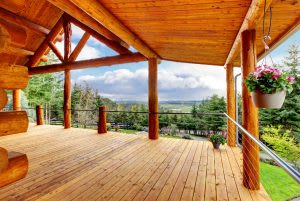Sipping on a cocktail while lying on a pristine beach over the summer holidays, you were ruminating about how fantastic this lifestyle was.
Perhaps you were watching your kids running around in the shallows of the water, screaming with delight, while your partner sat on the beach beside you beaming with joy.
“Life doesn’t get any better,” you thought.
And then it happened; you were hit with a brilliant idea. “We should buy a holiday home here!” you shouted. And your family cheered with joy.
Wanting the euphoria of holiday happiness to last forever, you meandered past the windows of real estate agencies, promising you’d keep looking online when you got home, making a purchase as soon as you got loan approval.
But now the holidays are over and you’re back to reality. Does investing in a holiday home still seem like a great idea?
You’re not the only person that’s had the same idea. Roy Morgan Research reported that in 2014 one in 40 people owned a holiday home This figure equated to less than 3% of the population who actually followed through on their impulse.
It’s easy to get caught up in the romance of owning your own holiday home, and wanting to make an emotional purchase while you’re on holidays.
However, the wisest move is to give it some time before you act. Let the memory of the holiday fade in your mind so you can think logically and make a more informed decision.

Will it make for a good investment?
While you might have had a great holiday in your destination of choice, there are a whole myriad of factors to consider before you jump the gun and buy a property, and there are lots of pros and cons to weigh up.
First of all you need to consider whether a holiday home in your chosen location would even make for a great investment. Is it an area that will experience capital growth or where you’ll get above average rental returns?
In the majority of cases, areas that are really attractive holiday destinations usually don’t have high growth potential because they lack the must-have fundamentals for investment properties. 
Many holiday destinations are simply tourist hubs and don’t have the factors needed to support permanent and long-term population growth, such as the necessary infrastructure and amenity, and long-term jobs, which is vital to maintain demand for your property and to drive capital growth.
Indeed, we visit them because they don’t have these factors – they’re much quieter and more subdued than busy capital cities.
If the area you’re looking at is a smaller hub with seasonal demand – such as a ski town or a beachside location – you’ll need to plan for how you’ll pay for your lifestyle property during these times, when demand is low and it’s not tenanted.
But you should first consider whether it’s worth buying a property that doesn’t have fantastic potential for growth at all.
Is it for pleasure or business, or both?
While I believe any property should be purchased with its investment potential in mind, it’s worth considering whether you’re buying the property strictly with your lifestyle in mind, for you to use on holidays, or whether you’re also buying it to rent out and make some income.
If you are buying largely for the lifestyle aspect, have a think about whether you will really use the property as a holiday home all that much in the future. Will you actually be able to get away from the grind very often to make the most of it? And what if you get bored of going to the same place every year?
Even when you do stay there, how relaxing will it be when you need to do all the chores you do at home, such as mowing the lawns and other maintenance? It’s not the same as simply renting a property for a few weeks that someone else is responsible for.
You’ll also need to consider when you will want to use the home – and that will likely be at peak holiday times, when rental demand is at its highest and when it’ll be of the greatest financial benefit for you to rent it out.

Will the returns outweigh the costs?
Many people justify buying a holiday home by saying that the returns will outweigh the costs. But will they?
They’re often cheap to buy, but consider why they’re cheap – have you just happened to snag a bargain or is it because demand in the area is low? If it’s the latter, what will happen when it comes time for you to sell, or even to rent your property? Will you be able to find tenants and get that impressive return?
The returns can certainly be higher than ordinary rental properties when tenants can be found, but it’s seasonal. The average period of high demand for holiday rentals is eight to 10 weeks a year, so this is when you’ll get the greatest rental returns, and it may be fairly quiet for the rest of the year.
According to RateCity, investors should aim to cover one month’s mortgage with one week of rent, which means you can pay the annual mortgage in only 12 weeks, giving you plenty of breathing space and time to use the property yourself.
Before you buy it’s essential to carefully calculate what the rental yield will be to make sure you can cover the mortgage payments. Part of this will include considering your expenses, which, in addition to those for an ordinary rental property will include greater upkeep and cleaning costs, as well as management fees, with the property being rented more frequently on your behalf.
Insurance may also be higher than a normal property, as insurance providers often find greater risk associated with these properties since they’re often vacant.
Just like any investment property you’ll need to have a financial buffer in case of slumps in demand or unexpected costs, but the risks can be higher with holiday homes since demand is so seasonal and tenant turnover is high.
Tax is the big benefit
There are good tax benefits associated with owning a holiday home – if it’s available for rent – which may help with your cash flow and even make buying the property worthwhile.
If the lifestyle property is simply for your own use there won’t be any tax concessions, but if you rent it at least for part of the time there will be substantial tax benefits. 
In line with negative gearing allowed by the Australian Taxation Office (ATO) owners of holiday homes can claim expenses such as interest, maintenance and repairs as a tax deduction, just as you would for any investment property, boosting your tax return.
If the holiday home is available for rent all year round you can claim all expenses, but if it’s only available for part of the time you can claim expenses for the time that it’s not being used by you, which is likely to be the majority of the year.
The major benefit of holiday homes at tax time is the ability to claim depreciation as a tax deduction – while you can do this for any property, the allowances are often greater for lifestyle properties because they’re fully furnished, with not only big ticket items such as beds, couches and whitegoods, but smaller items such as cutlery and crockery.
(NOTE: Deductions for these plant and equipment items may only apply if you bought the property prior to May 9, 2017, or if the items are brand new and you never use them yourselves – Read about the Budget changes here).
As long as the property is available for rent most of the year you can block out a two-week period over Christmas and claim the depreciation pro rata. You are still entitled to the deduction regardless of how many weeks the property is actually rented out, as long as it was available for rent for a full 50 weeks.
The key thing is to have a depreciation schedule completed before you rent the property out to maximise your deductions.
It’s also essential to keep documentation and evidence to show when your property was leased and what the expenses were during those times so you can provide this information to the ATO.
The ATO has cracked down on holiday homes in recent years so don’t break the rules – if you get caught there will be penalties.

Don’t make an emotional decision
While it’s easy to get caught up in the holiday hype and make an emotional decision to buy a home, think carefully before you act.
It’s often a better idea to simply pay for accommodation in the few weeks of the year that you take holidays and to buy an investment property in a location that has better potential for capital growth over time.
Many investors find that the financial burden of the expenses associated with a lifestyle property, including the purchase price, maintenance and bills, as well as dealing with the headaches of holiday tenants and letting agents, far outweigh the return.